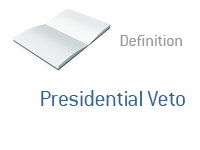Definition of Presidential Veto
What is a presidential veto? What is the definition of the term presidential veto?
The word "veto" is Latin for "I forbid".
A "presidential veto" takes place when the President of the United States (or any president for that matter) declines to sign a bill. When legislation passes through the House of Representatives and the Senate, the President will, in most cases, sign off on the bill. The bill then becomes law.
 The President has the option of returning a bill, unsigned, to the house of the United States Congress from which the bill originated. The President must outline his objections to the bill, and Congress must consider these objections.
The President has the option of returning a bill, unsigned, to the house of the United States Congress from which the bill originated. The President must outline his objections to the bill, and Congress must consider these objections. This is a veto.
In the United States, a presidential veto does not necessarily mean that a bill can not become law. Congress can choose to override the veto by a 2/3rd majority in each house. If this happens (which is extremely rare), then a bill can become law without the President's signature.
--
Davemanuel.com Articles That Mention Presidential Veto:
None
